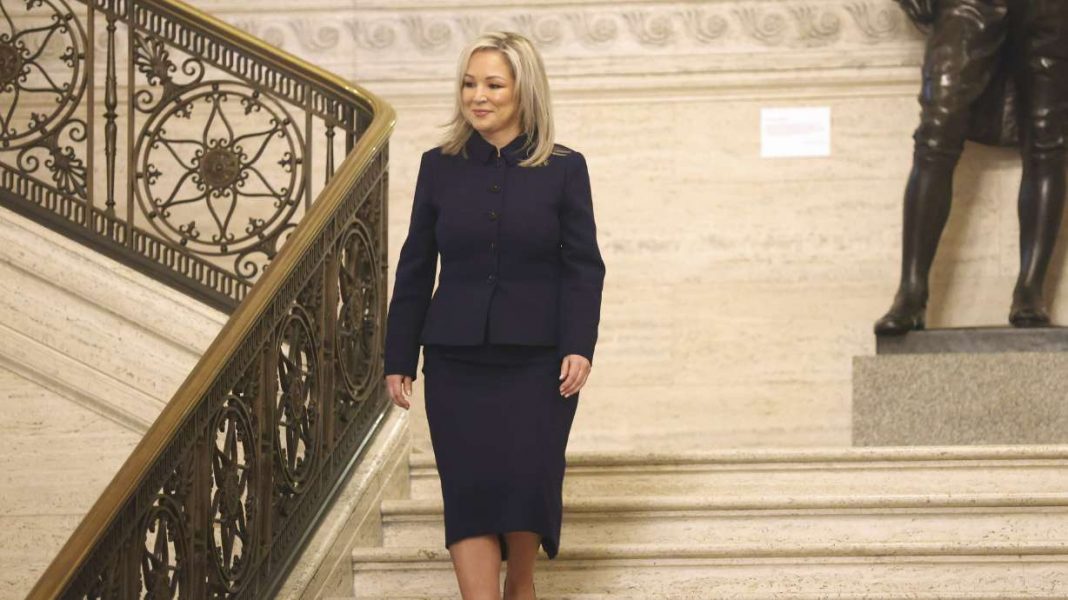LONDON — History was made on Saturday as an Irish nationalist became the first minister of Northern Ireland, marking the return of the government after a two-year hiatus due to a unionist boycott.
Michelle O’Neill, the Vice President of Sinn Fein, was appointed as the first minister in a government that, as per the 1998 Good Friday peace accord, shares power between the two primary communities of Northern Ireland — the British unionists who wish to remain part of the U.K., and the Irish nationalists who aspire to unite with Ireland. Northern Ireland was formed as a unionist, Protestant-majority region of the U.K. in 1921, following the independence of the Republic of Ireland.
“The era of second-class citizenship is a thing of the past. Today’s events affirm that it will never return,” O’Neill declared. “As an Irish republican, I commit to working honestly and cooperatively with my British colleagues who are of a unionist tradition and value the Union. This assembly is for everyone – Catholic, Protestant, and dissenter.”
Neither party can govern without the consent of the other. Over the past two years, government operations have been at a standstill after the Democratic Unionist Party (DUP) withdrew in protest of trade issues related to Brexit.
O’Neill will share power with Emma Little-Pengelly, the deputy first minister from the DUP. Although they will be equals, O’Neill, whose party won more seats in the 2022 Northern Ireland Assembly elections, will hold the more prestigious title.
Edwin Poots, the former leader of the DUP, was elected as the speaker of the chamber.
O’Neill, 47, was elected to the Stormont Assembly in 2007 and hails from a family of Irish republicans. Her party, Sinn Fein, was associated with the militant Irish Republican Army during the Troubles, a period of approximately 30 years of violent conflict over the future of Northern Ireland, which concluded with the Good Friday Agreement.
Gerry Adams, the former president of Sinn Fein who played a crucial role in brokering the historic peace agreement, was present in the gallery at the assembly to witness O’Neill’s nomination.
The government’s return comes exactly two years after a DUP boycott sparked by a disagreement over trade restrictions for goods entering Northern Ireland from Great Britain. The 1.9 million residents of Northern Ireland were left without a functioning administration as the cost of living skyrocketed and public services were stretched thin.
The peace process that ended the Troubles was built on the foundation of an open border between the north and the republic, leading to the imposition of checks between Northern Ireland and the rest of the U.K.
An agreement known as the Windsor Framework, reached a year ago between the U.K. and the EU, eased customs checks and other barriers but did not satisfy the DUP, which continued its boycott.
This week, the U.K. government agreed to new changes that would remove routine checks and paperwork for most goods entering Northern Ireland, although some checks will remain for illegal goods or disease prevention.
The new changes include legislation “affirming Northern Ireland’s constitutional status” as part of the U.K. and granting local politicians “democratic oversight” of any future EU laws that might apply to Northern Ireland.
The U.K. government also agreed to provide Northern Ireland with more than 3 billion pounds ($3.8 billion) to support its beleaguered public services once the Belfast government is operational again.
“I believe that my party has achieved what many said we couldn’t,” DUP leader Jeffrey Donaldson stated outside the assembly chamber in Stormont. “We have brought about change that many said was not possible, and I believe that today is a good day for Northern Ireland, a day when once again our place in the United Kingdom and its internal market is respected and protected in our law and restored for all our people to enjoy the benefits of our membership of the union.”




Agree
Thanks for sharing. I read many of your blog posts, cool, your blog is very good.